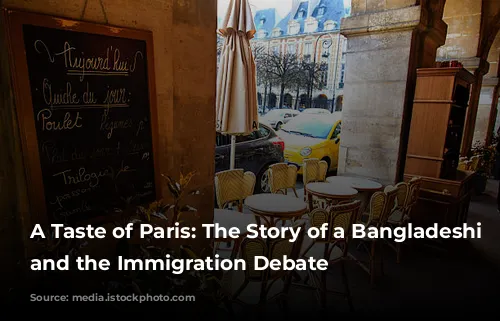The bustling terrace of Le Pinardier, a popular Parisian restaurant, is a scene of quintessential French life. Patrons indulge in local delicacies, accompanied by the finest wines, relishing the quintessential Parisian experience. However, behind this idyllic picture lies a crucial reality: the dependence of the French culinary landscape on immigrant workers.
This story unfolds in the heart of the restaurant’s kitchen, where a 24-year-old chef named Sazal Saha works tirelessly. Saha, originally from Bangladesh, embodies the dedication and resilience of immigrant workers who are the backbone of France’s hospitality industry. He juggles every aspect of the kitchen, from sourcing fresh ingredients to washing dishes, proving his commitment to French cuisine.
His journey to becoming a chef in Paris is an inspirational tale of ambition and perseverance. After receiving culinary training in France, Saha found his calling in the demanding world of Parisian kitchens. His journey highlights the significant role immigrants play in shaping the culinary landscape of France.

The Silent Contribution: Immigrant Workers and the Culinary Industry
The French restaurant scene is a melting pot of flavors and cultures, and its success is intricately linked to immigrant workers. Statistics paint a clear picture: a staggering 25% of French cooks are immigrants from outside the European Union. This reality underscores the crucial contribution these individuals make to the culinary sector.
The capital city, Paris, particularly relies on immigrant labor. Data reveals that over half of the city’s chefs are immigrants, primarily from South Asia, like Saha. These dedicated individuals are the backbone of the culinary scene, catering to tourists and locals alike.
Florian Mousson, the owner of Le Pinardier, acknowledges the indispensable role of immigrant workers in his restaurant. He emphasizes the demanding nature of the kitchen environment, with long hours, high temperatures, and physically demanding tasks. He highlights that French citizens are increasingly reluctant to take on these jobs, making immigrant workers vital for maintaining the success of his business.
Beyond Economics: A Deeper Perspective
The reliance on immigrant workers in the restaurant industry has sparked a debate about their economic impact. While some argue that restaurant owners prefer immigrants due to lower wages, Mousson vehemently denies this. He emphasizes that the scarcity of French applicants for kitchen positions makes hiring immigrants a statistical inevitability.
He clarifies that his priority is finding a skilled and dedicated worker, regardless of their origin. He cites Saha as an exemplary employee, praising his work ethic and dedication. He even acknowledges that Saha’s long hours are compensated with a respectable salary, debunking the myth that immigrants are exploited.
Saha’s story showcases the determination of immigrant workers to contribute to French society. He has successfully integrated into French life, owning an apartment in a suburb and forging a successful career. However, his future, like many others, is tinged with uncertainty due to the rise of anti-immigration sentiment.
The Looming Shadow: The Rise of Anti-Immigration Sentiment
The current political landscape in France is marked by the growing influence of the far-right party, National Rally. Their anti-immigration stance has gained traction, fueling anxieties among immigrant communities. This sentiment, fueled by discriminatory rhetoric, directly impacts individuals like Saha.
Saha’s voice echoes the sentiments of many immigrant workers. He expresses his bewilderment at the anti-immigration policies and calls for a fairer approach. He emphasizes that immigrant workers contribute significantly to the economy, paying taxes and contributing to society, yet face discriminatory policies.
Despite the challenges, Saha remains hopeful about his future in France. He expresses pride in his work, recognizing the value of his contribution to the French culinary scene. He embodies the resilience of immigrants, determined to build a fulfilling life in a country that he loves.
Saha’s story is a powerful testament to the vital role of immigrant workers in French society. It sheds light on the complex realities of immigration and its impact on the lives of individuals and the nation as a whole. While the political landscape remains uncertain, Saha’s dedication and resilience offer a glimmer of hope for the future.











